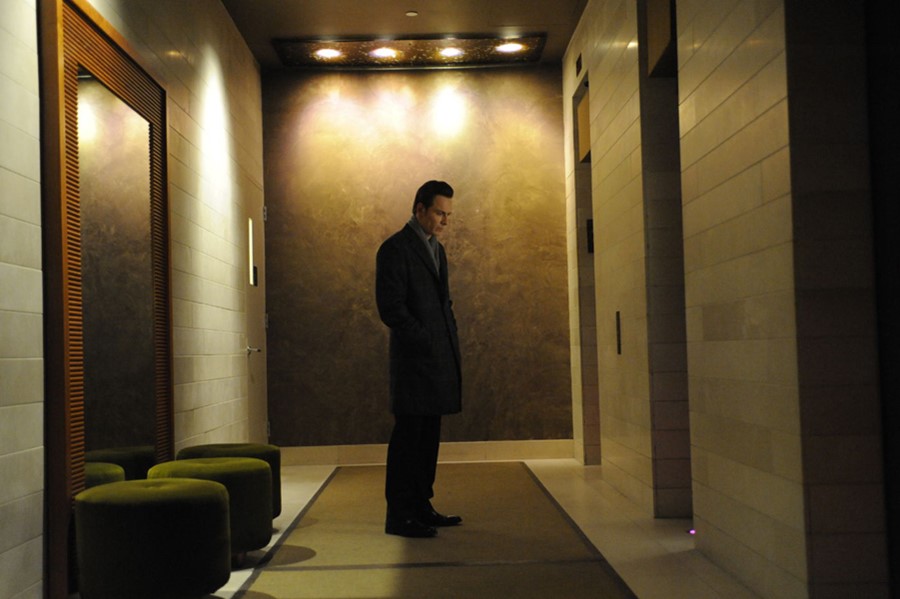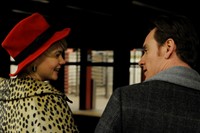Having starred as a hunger-striking IRA member in Steve McQueen's feature debut Hunger, Michael Fassbender again takes up a punishingly physical lead role in the British director's latest Shame, which garnered critical acclaim and a best actor award
Having starred as a hunger-striking IRA member in Steve McQueen's feature debut Hunger, Michael Fassbender again takes up a punishingly physical lead role in the British director's latest Shame, which garnered critical acclaim and a best actor award when it premiered in Venice. He plays corporate Manhattanite and sex addict Brandon, in a searing film which is not so much about sex as the abject terror of intimacy and which in its aesthetically stunning framing owes much to McQueen's background as a visual artist. Both McQueen and Fassbender were on hand to discuss the film this week following its north American premiere at the Toronto International Film Festival.
With your debut feature Hunger you took on overtly political, ideological subject matter. Shame is equally political but in a much more subtle way. What motivated you to take on this subject matter?
Steve McQueen: I was having discussions with Abi Morgan the co-writer, and in long conversations I was saying I didn't want to make a love story but I wanted to put down the gun. In every film there's a gun, there's revenge and all this kind of nonsense but there's so much stuff going on indoors, in the everyday. We talked about pornography on the internet and how accessible it is, the whole idea of sexual addiction as such and how accessible sexual images are to us every day, if you click something on your computer. It sort of snowballed from there really. Fascinating. I was also thinking of Lost Weekend, that film about alcohol addiction. But this guy, this character needs another person to fulfil his addiction – it's interesting, there's drama right there.
What draws you to Steve McQueen's work?
Michael Fassbender: The first time I met him I realised there was someone special sitting in front of me, somebody who had real empathy and someone who really loved human beings and liked asking questions about why we're here, how we relate to each other and how we relate to ourselves. I just knew that I was going to learn something from him and I must work with this man.
Why set it in New York?
SM: I wanted to place the character in the setting of excess and access. And New York seemed to be the ideal place for this character. We're not there yet in London as far as 24-hour service is concerned.
MF: You have to know where to look.
What kind of research did you do?
MF: I just sort of threw myself into it (laughs). No, the research for me is always kind of the same. I just spend a lot of time with the script. I just reread it, reread it, reread and after a while it sort of sits with you like another layer of skin.
How does Brandon's sexual behaviour ties into his whole psychology?
SM: The first time I heard of the whole idea of sexual addiction I laughed, as you do. It reminds me of the good drunk: “He's great, you know, when he's drunk, he's so sunny.” And when the only way the guy gets through the day is through a bottle then it ceases to become funny, and it's the same with sexual addiction. It ceases to become funny when this person needs sex every moment of the day to get through a day. There was this wonderful quote I found with the whole idea that thirst and alcohol have nothing to do with each other. Sex has nothing to do with sexual activity. It's a need, a high.
MF: I think when I was looking at the idea I think the mental health board or those who decide what is mental illness and what is not don't recognise it as a condition. Yet I think it's something like 24 million people in America alone claim to be suffering from it. And I think for me addiction would mean that you realise there's a pattern happening and yet you can't break that pattern and through that pattern your work is affected and the relationships in your life are affected by it. I just thought that that was enough for me to go on really. And because we have so much information being thrown at us these days, so much choice, we're told we should be doing so many things, gaining so many material objects, wearing the right clothes in order to bring happiness, I thought there was an awful lot there that seemed real to me, I could recognise it in the world we all live in. It can come with gambling, with our relationship with food, with sex as in this case here, or alcohol and drugs, it's kind of the same thing.
SM: It's also to do with free will. We all think we've got free will. We haven't. I wish I was a robot, we were all robots in a way to do what we want to do. You know, I want a six-pack, it's not going to happen, I want a biscuit or whatever. It's the same thing that's going on with Brandon, what's going on with Sissy. Unfortunately we live in not the best of worlds, because we keep on fucking up. Then we think okay, let's fix it. Then we keep on fucking up, then trying to fix it. So it has a very broad brush, the situation.
What influence did your experiences in art school have in terms of your trajectory moving from a visual artist into a filmmaker?
SM: Experiment. Just experiment and muck about. On set half the time I don't know what I'm doing, and I'm very proud of it. Because I just want to find what works and what doesn't work. And often you find that what doesn't work actually bloody works.
Shame will be released January 13 2012.
Text by Carmen Gray



